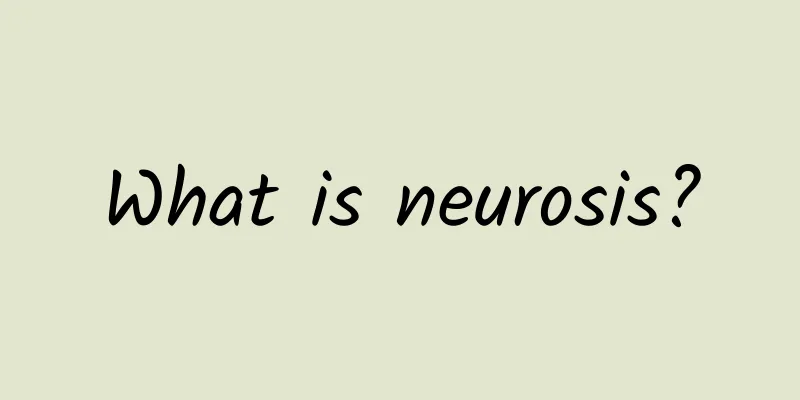What is neurosis?

|
Neurosis is also called neurosis or psychoneurosis. It is a general term for mental disorders, including phobia, anxiety, obsessive-compulsive disorder, neurasthenia, etc. It has a great impact on the patient's mental health and physical health, and will extend to social functions. The causes are also relatively complicated. First of all, it is related to one's own genetics, and also to some social and psychological factors. Causes The onset of neurosis is usually related to adverse social and psychological factors, and unhealthy qualities and personality traits often constitute the basis of the onset of the disease. The symptoms are complex and diverse. The typical experience is that patients feel they cannot control psychological activities that they think they should be controlled, such as anxiety, persistent tension, fear, nagging worries, self-perceived meaningless delusions, obsessive thoughts, etc. Although the patient had a variety of physical discomforts, clinical examination failed to reveal any organic lesions. Patients are generally able to adapt to society, and their behavior generally remains within the scope permitted by social norms and can be understood and accepted by others, but their symptoms hinder their psychological or social functions. Patients feel distressed and powerless about their symptoms and often urgently request treatment. Their self-awareness is intact or completely intact. Neurosis is also one of the most common diseases in outpatient clinics. Clinical manifestations The symptoms of neurosis are complex and varied. Some include headaches, insomnia, and memory loss; others include palpitations, chest tightness, and feelings of fear. Its characteristic is that the emergence and changes of symptoms are related to mental factors. For example, some patients with gastrointestinal neurosis suffer from diarrhea whenever they are emotionally stressed. 1. Clinical symptoms of autonomic dysfunction (1) Mental fatigue associated with mental excitability is manifested by increased associative recall, decreased mental workload, physical weakness, fatigue, etc. (2) Emotional symptoms include worry, irritability, tension, etc. (3) Sleep disorders mainly manifest as insomnia. (4) Head discomfort, tension headache, feeling of heaviness or tightness in the head, etc. (5) Visceral dysfunction: bloating, intestinal rumbling, constipation or diarrhea; palpitations, chest tightness, shortness of breath, limb weakness, fatigue, feeling of impending death; low-grade fever; positive skin scratch sign; irregular menstruation in women, spermatorrhea and impotence in men, etc. 2. Clinical symptoms of cardiac and gastrointestinal autonomic nervous system dysfunction Cardiac autonomic dysfunction, also known as cardiac neurosis, is a syndrome mediated by the autonomic nervous system of the cardiovascular system and influenced by mental factors. The main clinical symptoms are precordial pain, palpitations, shortness of breath or hyperventilation, and a sense of impending death. In addition, there are also symptoms such as fatigue, dizziness, sweating, and insomnia. |
<<: How to remove moisture from the body
Recommend
What is thrush spray?
Diseases such as thrush mostly occur in young bab...
Why does your skin become better during your period?
Some women will find that their skin is better du...
Can people with Yin deficiency undergo moxibustion?
Yin deficiency constitution is a common constitut...
Can I drink alcohol while taking liver protection tablets?
It is best not to drink alcohol when taking liver...
Dietary Guidelines for Gout
For gout patients, daily diet is very important. ...
What causes a smelly nose?
In daily life, we are often troubled by some nasa...
What are the medicinal properties of Leigong Pao?
Today, we are going to talk about the medicinal p...
What is the method of making Cordyceps sinensis tea?
Cordyceps sinensis is a relatively precious Chine...
Polio vaccine
The polio vaccine is mainly a vaccine for polio, ...
What is Pre-pregnancy Chinese Medicine Conditioning
In fact, regulating the body is very important fo...
What ingredients can be used to make porridge with millet to nourish the stomach
Millet is the most common type of rice in our dai...
What are the benefits of Chinese medicine cupping? Three major conditioning benefits
Cupping in Traditional Chinese Medicine is a very...
Is chronic bronchitis contagious?
I believe many of my friends know a lot about chr...
What are the traditional Chinese medicine prescriptions for treating low back and leg pain?
Pain in the waist and legs is mainly caused by he...
What are the traditional Chinese medicines for liver health?
The liver is the most important organ in the huma...









